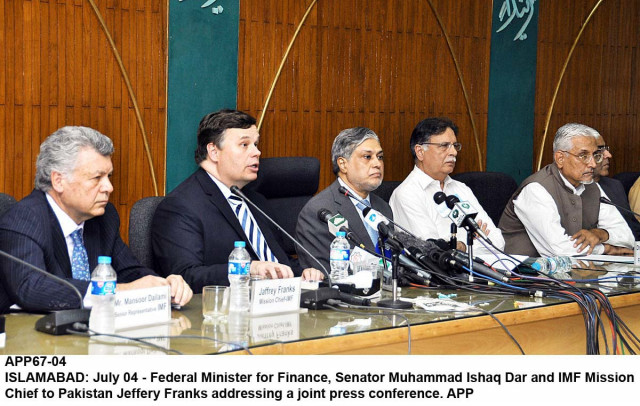Analysis: IMF bailout could help, but it probably won’t
The bureaucracy is too busy protecting its own interests to protect those of the nation.

Finance Minister Ishaq Dar along with IMF mission chief Jeffery Franks addressing the joint press conference about Pakistan's IMF loan deal. PHOTO: APP
Pakistan has entered so many bailout programmes with the IMF that, by now, the bureaucrats at the finance ministry consider the Washington-based lender to be a serious source of regular funding instead of a lender of last resort that it is supposed to be. And they have grown increasingly more skilled at outright conning the IMF into imposing conditions that minimise the work the bureaucrats have to do, but also have the effect of sinking the country further into fiscal quicksand.
And this particular IMF programme has the Q Block babus’ fingerprints all over it. Consider, for example, the inexplicable condition that the Council on Common Interest somehow gets the consent of the provinces to run artificial surpluses in order to make the overall fiscal situation of the country look good. This is not a condition that originated in the IMF’s heads: it came from the finance ministry bureaucrats who loathe and despise the National Finance Commission award because it took away money – and therefore power – from them and gave it away to the provinces. They want it back, and they have managed to convince the IMF that this is a good way to reduce the budget deficit.
And therein lies the dirty little secret of the IMF bailouts: while the international lender has broad policy guidelines what it thinks is sound fiscal and economic policy, the detailed proposals for exactly how to achieve those goals are suggested mainly by bureaucrats in the finance ministry and the Federal Board of Revenue, with the occasional good idea wandering in from the State Bank of Pakistan or the Planning Commission.
So here is how this charade goes: the bureaucrats call in the IMF, because they do not want to actually do their job and collect taxes. They present a highly distorted picture of the problem which somehow omits just how flawed their own policies are and instead blame things that have nothing to do with the core of the government’s financial mismanagement problems.
This provincial budget surplus condition is a case in point. The NFC award is in no way responsible for the federal budget deficit, but the bureaucrats will not tell the IMF that. They will only show how much money gets transferred to the provinces, while neglecting to point out the fact that the deficit would shrink a lot faster if the government simply did what it is supposed to and cut back energy subsidies and privatise grossly mismanaged state-owned enterprises. That is where two-thirds of the deficit problem comes from.
Of course, the IMF is not stupid. They know they are being taken for a ride, but they also have no choice. They have sunk money into Pakistan and, much as one may hate them, it is the civil servants whose job it is to get that money back. So the IMF gives in on the provincial budget demand and in exchange demands that the deficit be reduced even more than the finance ministry’s original target and that the cuts come from subsidies.
Now, a fair deal would be for the bureaucracy to give the IMF what it wants in exchange for getting what they want. But the bureaucracy is not playing to be fair. They are playing to win. So the cuts may well come, but they will come from the development budget, which is the part of federal spending that does not pay for their perks and privileges. A small part of the development budget does provide perks to bureaucrats, but worry not: that is the part that will stay in.
Readers may have noticed by now that the finance minister has not been mentioned in any of this. There is a reason for that. If the repetitive cycle of IMF bailouts from 1989 has taught us anything, it is this: the finance minister may not be innocent in all of this, but at the end of the day, he is just a bystander, powerless in front of the mighty Civil Service of Pakistan.
Published in The Express Tribune, July 7th, 2013.



















COMMENTS
Comments are moderated and generally will be posted if they are on-topic and not abusive.
For more information, please see our Comments FAQ